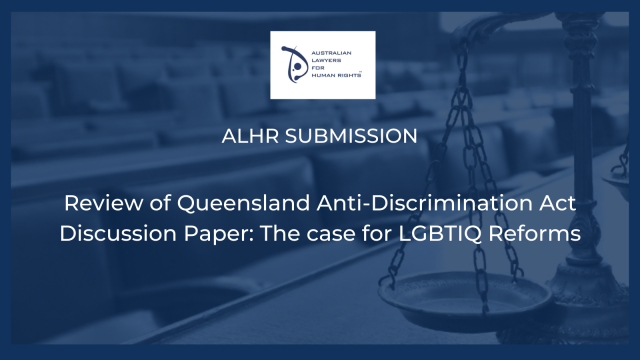Submission: Review of QLD Anti-Discrimination Act Discussion Paper

ALHR made a submission in response to the Queensland Human Rights Commission’s November 2021 Discussion Paper Review of Queensland’s Anti-Discrimination Act.
Our submission expands on ALHR’s earlier submission to the recent Queensland Parliamentary Inquiry into Serious Vilification and Hate Crimes. Prepared by our LGBTI Rights Committee, the focus of this work is primarily on issues relevant to lesbian, gay, bisexual, transgender, intersex and queer (LGBTIQ) people and communities, both as an area of ALHR expertise, and also because we believe the LGBTIQ protections offered under the Anti-Discrimination Act 1991 (Qld) (the Act) are in need of significant reform.
In particular, we will address questions which relate to the following terms of reference from the scope of the Review:
- the attributes of discrimination, including: i) whether the current definitions given to protected attributes best promote the rights to equality and non-discrimination; and
- whether additional attributes of discrimination should be introduced. h) exemptions and other legislative barriers that apply to the prohibition on discrimination.
Read a copy of our submission in full here
We make the following recommendations
- There should be a new definition of gender identity, to ensure a diverse range of gender identities, including nonbinary, are protected under the Act. This definition could be modelled on the approaches under the Public Health Act 2005 (Qld) or Equal Opportunity Act 2010 (Vic)
- There should be a new definition of sexuality, to ensure a diverse range of sexual orientations are protected under the Act (including pansexual and queer). This definition could be modelled on the approaches under the Public Health Act 2005 (Qld) or Equal Opportunity Act 2010 (Vic).
- The attribute of sex characteristics should be introduced.
- Sex characteristics should be defined in line with the Yogyakarta Principles +10 and the Malta legislation.
- Exemptions should not be used to exclude intersex athletes from competing. A blanket exemption applying to intersex people is disproportionate, and might broadly limit their access to sporting activities, with adverse consequences for health and well-being. We endorse the recommendation by Intersex Human Rights Australia (IHRA) that ‘Regulations and guidance on including people with innate variations of sex characteristics in sport should always state that women and men with innate variations of sex characteristics can play or compete in their birth-observed/birth-assigned sex.’ No sport exemptions should be available in relation to the attribute of ‘sex characteristics’
- Religious exceptions in s109(d) of the Act should be reformed, to ensure that discrimination is only permitted on the basis of religious belief and not other attributes like sexual orientation, gender identity or sex characteristics, and that where the service delivery involves the expenditure of public funds, such discrimination must also be ‘reasonable and proportionate in the circumstances’. These reforms should be informed by existing exceptions in Tasmania, and soon-to-commence provisions in Victoria.
- Religious educational institutions and other religious employers should only be allowed to discriminate on the basis of religious belief and not other attributes like sexual orientation or gender identity. Such discrimination should also be a genuine occupational requirement of the position, as well as being reasonable and proportionate in the circumstances. The drafting of a new provision should be informed by the recently-passed but yet to commence sections 82A and 83A of the Equal Opportunity Act 2010 (Vic).
- Section 28(1) of the Act should be repealed, to ensure intersex, trans and gender diverse people are protected against discrimination where their employment involves ‘the care or instruction of minors’, and to address the stigma and transphobia which this provision causes.
- Section 45A of the Act should be repealed, to remove lawful discrimination against rainbow families and single parents who wish to have children, as well as against people with variations of innate sex characteristics who may wish to access forms of reproductive technology not stereotypically associated with members of their legal sex.
- The Queensland Anti-discrimination Act should introduce a prohibition on the use of assisted reproductive technology processes to select against variations of sex characteristics.



